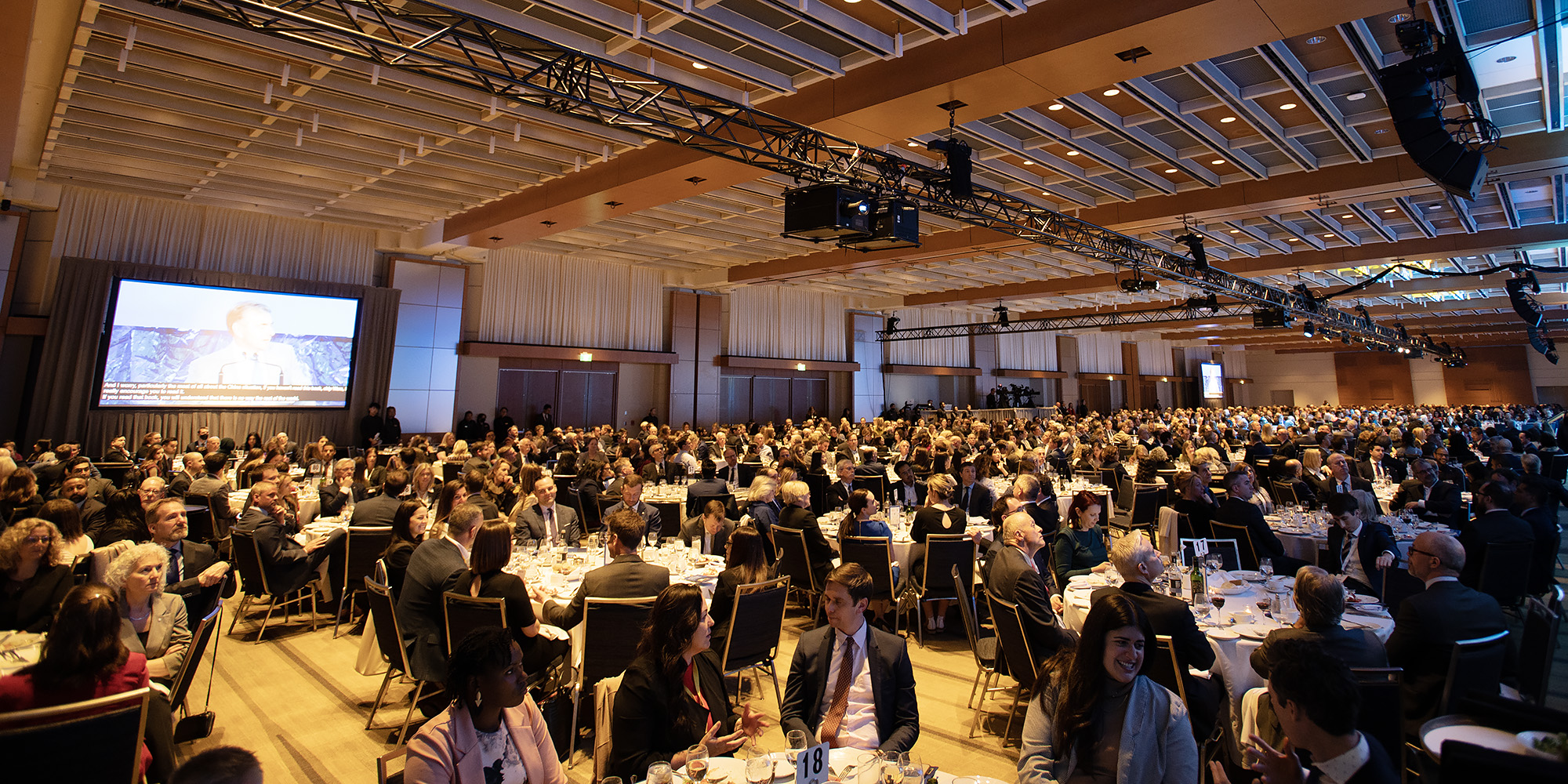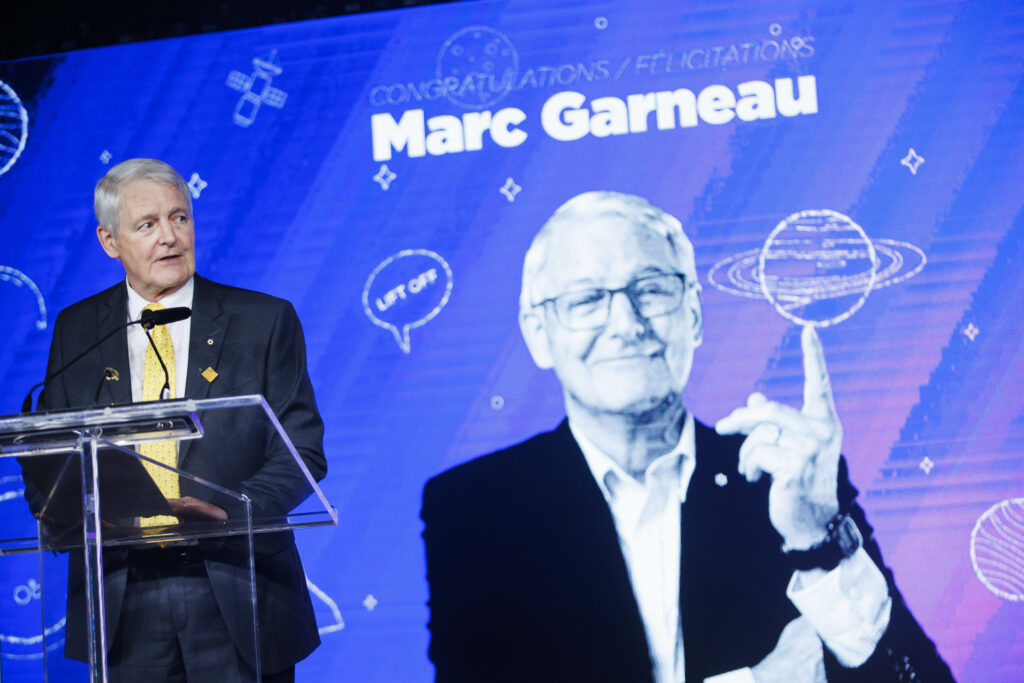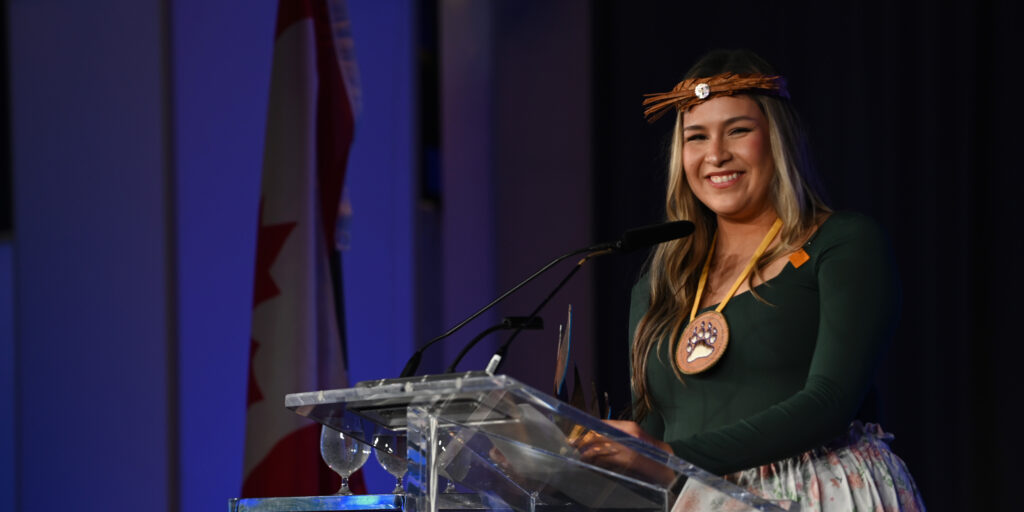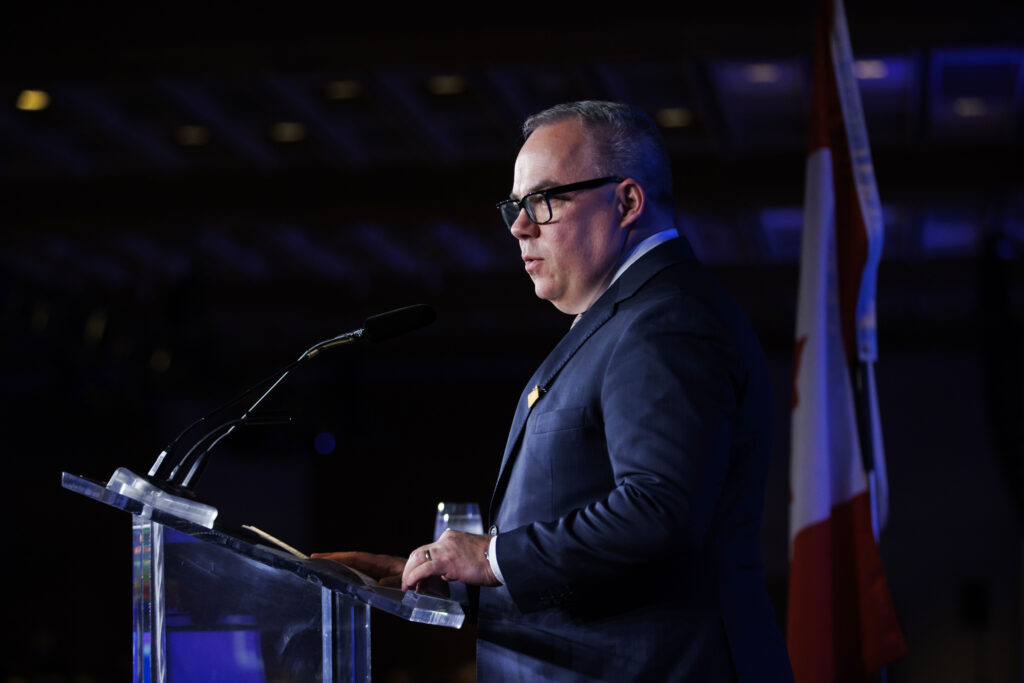
Live blog: More than 1,000 wonks and leaders gather for 2024 Testimonial Dinner
8: 55 p.m.
It’s a wrap. see you at Wonk Prom.
8:47 p.m.
JP Gladu — former head of the Canadian Council for Aboriginal Business and principal at Mokwateh — wins a Testimonial Award.
From Gladu’s inspiring acceptance speech:
Times they certainly are changing. The Canadian balance sheet is starting to shift. What side of the ledger do you want to be on? And don’t tell me that we can’t have resource development and a healthy environment. I live on my First Nation. I’ve witnessed the leadership over the past 25 years, when we went from a community of nothing, quite literally nothing, because the government had burned our community down… in 1958. That’s the repatriating part. Now we are accumulating with a sawmill producing lumber for the region. We have bio gasification projects, running hydro assets. We have tons of mining activity in our region.. and we have incredible tourism on Lake Nipigon, which is the largest lake in Ontario encompassed within the boundaries – and it’s pristine and it’s healthy, and our communities live on it.
On economic reconciliation:
We must stop looking at economic reconciliation as something that we have to do.
We must look at it as our competitive edge. .. When we empower the Indigenous workforce, we create certainty for the communities as they go into the future.
And when we capitalize our communities to participate in equity projects, that becomes a form of consent. This is nation building. Friends allow me to be even bolder: 10 years from now, we will see there will be a new ownership class in Canada. It will be comprised of Indigenous people and nations who have put their lands, waters and human capital to build a future for themselves. And for all Canadians.
8:40 p.m.
Janice Charette — mental health advocate and organizational wellness champion and two-time Clerk of the Privy Council — wins a Testimonial Award.
Some highlights from her speech:
The speed of change is accelerating and the reality of simultaneous and interlocking crises are unfortunately with us to stay. So no doubt in the face of all of these pressures our institutions are under great stress. They need to adapt and evolve in order to stay relevant to retain the trust and confidence of those that they serve. The public service has been adapting to these challenges, but there’s more to be done.
Too many good people who have put up their hand to make a difference to bring their experience and their knowledge to advance the public good have been subjected to attacks on their integrity and threats to themselves and to their families. This cannot continue.
Let us take inspiration from the words of Theodore Roosevelt. It is not the critic who counts. We need to celebrate those that are actually in the arena, who do actually strive to do the deeds that spend themselves in a worthy cause.
8:30 p.m.
Murad Al-Katib — who grew an idea into a $3-billion-a-year business, and revolutionized an industry in the process — is our next Testimonial Award winner.
Murad begins on a personal note:
My mother used to say to us as kids, you have the luxury of growing up in a democracy and in a democracy every four years you get a chance to go into a ballot box and secretly mark your balance. And you get to have your say, but as a leader, you have to come out of that ballot box and hear the will of the people and give yourself to the government of the day and help to affect change in policy. And that has always been my inspiration my career.
On agriculture:
I have just one thing to say: the world needs a little more Canada. Our abundance of land and water coupled with our world class farmers is a societal solution for food security and inflation.
The post COVID Supply Chain disruptions have not been only a slap in the face of the world, but a punch in the nose. Everyone needs to recognize that agricultural crops make up 82% of the global calorie supplies, but less than 25% of the total agricultural land use in the world, crop productivity is key to reducing food insecurity.
Careful stewardship of our soil health of our environment and our sustainable technology use is going to increase our crop production as we continue to go forward and the protein highway starts in Canada and links to the emerging markets of the world.
His challenge to Canadians:
We are all policy people here and I want you all to recognize one thing: you don’t have to be a business owner, to be an entrepreneur.
And I want to challenge you all to continue to own the job that you do. I want you as entrepreneurs to be bold. I want us and Canada to stop aspiring just to grow enough to be bought by somebody or to be something that’s of significance to somebody.
8:20 p.m.
Jayna Hefford, five-time Olympian and one of the greatest hockey players of all time, wins a Testimonial Award after launching the Professional Women’s Hockey League in her most ambitious expectation-defying act yet.
On her early hockey career, she says:
“I believe support unites people, unlike anything else. It brings communities together creates a common bond. It brings joy, exhilaration, and it provides for many a sense of belonging. I grew up as a young girl and Kingston, who loved hockey. I’m not sure if it was innate or if it was learned, but the game has always been a part of who I am.
There were very few girls at that time playing organized hockey and I was fortunate to have parents who never once tried to steer me away from this uncommon path. I didn’t appreciate how important that was to me and who I would become until much later in life.
On equality in sport:
After I retired from hockey, I didn’t know where my path would lead. But I knew I wanted to stay in sport. We still have a long way to go to create equitable opportunities for girls and women in hockey.
I cared so deeply about the game For the women who played it and I always believed in the importance of the development through sport both as an individual and as a community.
On the creation of the PWHL:
To say it’s been a success to date would be an understatement. We’ve exceeded our projections as it relates to viewership, attendance, sponsorship sales merchandise sales.
Again, the demand for women’s sports is real.
(A heckler! “Go Ottawa!”)
The thing that makes me proud though is it’s not about hockey. It’s about changing society. So we’re creating change for the next generation. Girls and boys growing up in a world that has fewer boundaries, fewer limitations.
8:10 p.m.

Marc Garneau — former naval commander, first Canadian astronaut, federal transport minister – wins a Testimonial Award.
Some excerpts from his fascinating acceptance speech:
On the navy:
Given our location on the planet, Canadians don’t feel particularly threatened, but the question is are we pulling our weight on the world stage? My answer? Not enough to be taken as seriously as we would like to be.
On space:
Prescient Canadian leadership and vision, beginning in the 1960s, made Canada a leader in space in the 20th century. Why? The answer is very simple. Because we realized just how much space technology could help us in our daily lives. Are we now falling behind as a spacefaring nation, or will we keep our foot on the gas because it’s important and because we’re good at it?
On foreign policy:
Throughout its history, Canada has focused mostly on its neighbours to the south and across the Atlantic. We are now in the Indo-Pacific century and Canada is playing catch-up. Our foreign policy needs to be more proactive.
On taking risks:
Nothing focuses your mind like sitting on a rocket about to unleash seven million pounds of thrust. You have to believe in what you are doing and have a certain tolerance for risk.
That’s how I’ve tried to lead my life and it’s what I’d like to leave with you. Let’s not shy away from every risk as we develop the policies and vision that will move our great country forward in this century. We can do some great things if – on occasion – we move out of our comfort zone.
Marc Garneau receives a standing ovation.
6:58 p.m.

Raven Lacerte, co-founder of the Moose Hide Campaign, is the winner of the Emerging Leader Award.
She is greeted with a long standing ovation.
Lacerte begins her speech explaining how the Moose Hide Campaign was born:
“We were hunting a moose along the Highway of Tears where many women have been murdered or have gone missing. We were blessed with a moose one morning and decided that we were going to take action.
My sisters and I cut up the first 25,000 squares of moose hide and we hand wrote on these little index cards about what we’re trying to do and we said that if you wear this then you promise never to do violence towards women and children. And you also promise to speak out and take action to end that violence.”
She continues:
“Over the past 13 years of doing this work, trying to spread this medicine across Canada to create spaces where we can talk about this important issue where Canadians can see that each of us have a role to play in this to make that change that we so desperately need.
And it can be exhausting on my heart and my spirit to hear so many stories of the people that are impacted by this issue.
But the thing is that I also get to hear the stories of impact. I hear that people feel seen, they feel heard, respected, that there is hope and that they matter.
I share this because I want you to know that there is so much hope. But there’s also so much work left to do.”
6:40 p.m.
Second award of the night goes to Raven Lacerte, inspiring co-founder of Moose Hide Campaign— a national movement of Indigenous and non-Indigenous Canadians speaking up against gender-based and domestic violence. Profile here.
6:38 p.m.

Paul Wells, one of Canada’s most highly respected journalists, wins the Hyman Solomon Award for Excellence in Public Policy journalism.
Here’s an excerpt from Paul’s speech and it is a must-read:
“Public figures and businesses and large organizations no longer have to go through reporters to reach the public. They can use social media, email lists, direct mail, YouTube and more.
This huge change has the effect of demoting everyone in my line of work. The politicians are right, they can go around us. It doesn’t much matter whether we love that or hate it, it’s just a fact.
But I’ve got a question. When politicians, businesses and other organizations go around us, are they doing it to get the truth to you by a shorter path? All of the truth?
Well, let’s see.
It is easier for governments today than it has ever been to tell you why they have missed every greenhouse emissions target they ever set. Have they used that power to provide those explanations?
Government could have gone right around me to tell you which foreign regimes sought to intimidate diaspora communities from exercising the rights that should belong to everyone in Canada.
Or why precisely most of the Canada Digital Adoption Program shut down two years early.
These days no government needs the help of the Globe and Mail or Le Devoir to tell you who’s getting richest off of connections that are valuable only because Ottawa is far too complicated for ordinary citizens to navigate.
And nothing is stopping the people who know from telling the rest of you what Jenni Byrne does within a party that might soon form a federal government, what her mandate is and what its limitations are, if any.”
6:34 p.m.
Paul Wells, one of Canada’s most highly respected journalists, wins Hyman Solomon Award for Excellence in Public Policy journalism. Profile here.
6:28 p.m.
James introduces PPF President and CEO Edward Greenspon.
Greenspon talks about the importance of the Canada-U.S. strategy.
“What’s uppermost in my mind is actually taking place outside Canada. Nothing looks as consequential for Canadians this year as the American election of Nov. 5.
We have arrived at this tricky historical juncture. Geopolitical tensions – Russia gone rogue, new red lines around China – they are drawing us ever more closely into the U.S. orbit – and doing so at the very moment that orbit is becoming less stable.
As globalization cedes ground to ‘Blocal-ization,’ we find ourselves inside a friendshoring community, one still led by the United States.
Our question isn’t which bloc — that’s obvious — but how we can Matter More within our bloc, regardless of who is President of the United States
All the ‘friends’ share the need to reduce their reliance on the geo-economic extortions of China and Russia. Meanwhile, we are blessed with strategic assets like uranium, fertilizer, food, water, natural gas, clean power, carbon burial sites and critical minerals – to name just a relevant few. And we are a frontline state in a newly and hotly contested Arctic.”
6:14 p.m.
We begin with a beautiful version of the anthem from Sienna Rose, who also sang at the inaugural The Professional Women’s Hockey League game earlier this year.
The great Yolande James is back for another year of emceeing the awards. And Michael de Adder is sketching the night. We’ll see what he’s been up to later this evening. Follow us live on CPAC.
5:58 p.m.
The Annual Testimonial Dinner Honour Roll 2024 has begun!
We’ll be covering the festivities, along with more than 1,200 leaders and policy wonks from all sectors of society who have gathered to pay tribute to distinguished Canadians who have made outstanding contributions to public policy and good governance.
The honourees being recognized this year:
- Marc Garneau, Canada’s first astronaut, whose triptych career spanned industries, ministries — and planets;
- Janice Charette, the first two-time Clerk of the Privy Council and former High Commissioner for Canada to the United Kingdom;
- JP Gladu, the innovative founder of Mokwateh and compelling advocate for Indigenous economic reconciliation;
- Jayna Hefford, multiple Olympic gold medal winner, and force behind the Professional Women’s Hockey League;
- Raven Lacerte, co-founder of the Moose Hide Campaign, whose work launching a national movement that distributes symbolic pieces of moose hide challenges men, boys and all Canadians to end violence against women;
- Paul Wells, journalist and podcaster whose impactful work offers a model for a journalism business in crisis; and
- Murad Al-Katib, President and CEO of AGT Food and Ingredients Inc., who transformed agriculture in Saskatchewan.


